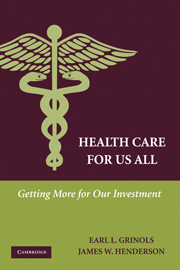Book contents
- Frontmatter
- Contents
- List of Tables
- List of Figures
- Preface
- Acknowledgments
- Executive Summary of the Targeted Intervention Plan
- PART I GOALS AND WORKING PRINCIPLES
- PART II BACKGROUND ECONOMICS AND ETHICS
- PART III APPLICATION
- PART IV PROTECTIVE MEASURES
- 9 Forestalling Free Riders
- 10 Preserving Prices
- 11 Inducing Innovation
- 12 Summary
- A Top Ten Goals for the American Health Care System
- B Badly Done Insurance Programs Can be Worse Than No Insurance
- C Incentive Symmetry and Intervention Principle
- D Plan Workability
- E Market Power Response to Insurance
- Glossary and Definitions
- References
- Index
9 - Forestalling Free Riders
Published online by Cambridge University Press: 05 June 2012
- Frontmatter
- Contents
- List of Tables
- List of Figures
- Preface
- Acknowledgments
- Executive Summary of the Targeted Intervention Plan
- PART I GOALS AND WORKING PRINCIPLES
- PART II BACKGROUND ECONOMICS AND ETHICS
- PART III APPLICATION
- PART IV PROTECTIVE MEASURES
- 9 Forestalling Free Riders
- 10 Preserving Prices
- 11 Inducing Innovation
- 12 Summary
- A Top Ten Goals for the American Health Care System
- B Badly Done Insurance Programs Can be Worse Than No Insurance
- C Incentive Symmetry and Intervention Principle
- D Plan Workability
- E Market Power Response to Insurance
- Glossary and Definitions
- References
- Index
Summary
I shall be telling this with a sigh
Somewhere ages and ages hence:
Two roads diverged in a wood, and I,
I took the one less traveled by,
And that has made all the difference.
Robert Frost, “The Road Not Taken,” 1920Summary: Those who go without health insurance burden more than just themselves. Persuading individuals to purchase insurance removes this burden on others. Massachusetts and Switzerland demonstrate that universal access to high-quality medical care is possible without turning to single-payer or a purely public sector approach.
Background
The patchwork quilt of plans and programs that is the current U.S. health care system, where access is secured primarily through employer-sponsored insurance supplemented by myriad government programs targeting vulnerable population groups (primarily indigent and elderly), has produced unique problems of affordability and choice. With family premiums at or above $10,000 per year, many Americans go without insurance, instead burdening taxpayers and those with private coverage to fund their care via cost shifting. Many uninsured are doubtless unable to absorb the cost of a standard health insurance policy in their monthly budget. But many, upward of 30 percent of the total number of uninsured at any given time, have annual household incomes that exceed $50,000 (approximately 300 percent of the federal poverty level for a family of four). For individuals who can afford coverage, unwillingness to accept personal responsibility to purchase insurance must explain going without coverage. The “free rider” option is possible because no one is refused necessary care.
The challenge for U.S. health care reform is to improve access to care significantly without jeopardizing quality and patient choice.
- Type
- Chapter
- Information
- Health Care for Us AllGetting More for Our Investment, pp. 167 - 177Publisher: Cambridge University PressPrint publication year: 2009



